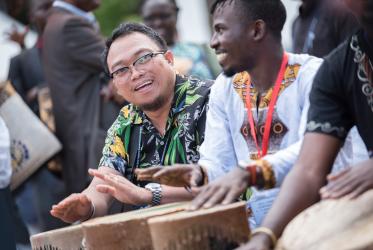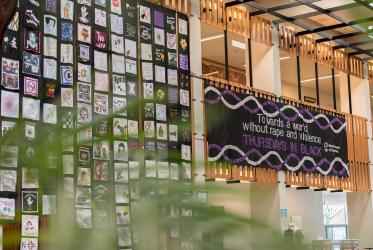As Rev. Dr Benjamin Simon, director for the World Council of Churches (WCC) Commission on Education and Ecumenical Formation and the dean of the Ecumenical Institute at Bossey, said in his introduction, “The title of the book speaks for itself.”
In-person and online, participants were able to share their reflections and pose questions to the author, Rev. Dr Angelique Keturah Walker-Smith, strategist for Pan-African and Orthodox Faith Engagement, Bread for the World, National Council of Churches of Christ in the USA governing board member, and WCC president from North America.
Prof. Dr Amélé Ekué, academic dean of Globethics.net and professor of Ethics, asked: “How do we inspire future leaders of pan-African descent?”
She also noted that many topics in the book are intersectional and transversal, and reflected how the women in the book continue to inspire the next generation. “They are living into the future also through these younger women leaders and I think this makes us particularly proud to witness this, and we see this is really embedded in the ecumenical journey,” she said.
Rev. Dr Yvonne Delk, former general minister and president of the United Church of Christ in the US, shared recorded reflections.
“I’m so grateful to be one of those women she included,” said Delk, who was involved in the WCC’s Programme to Combat Racism from 1984 to 1994. “Together, we were able to make an impact on our time,” she said.
Dr Brigalia Bam, a South African whose work at the WCC from 1967 to 1981 focused on women and the Programme to Combat Racism, reflected on how important the book in serving as a living document for the kind of people who are already emerging as the next ecumenical leaders. “Let’s preserve many people who are living,” she said.
Walker-Smith said it’s important to examine the context in which the women featured in the book were brought up. “How was it possible that you have the gift of these women?” she asked. “I am pleased to say that the women in this book are in kinship with my mother.”
Rev. Jackie Makena Mutuma, a Kenyan Methodist clergywoman and vice moderator of the WCC Commission on Faith and Order, recalled her first encounter with WCC at the 11th assembly in Karlsruhe.
Identifying herself as a product of mentorship, she urged people to hold the hand of others. “We need both men and women. We need both young and old,” she said. “We need people from all walks of life.”
Eva Kyeni Abel, also from Kenya, a religious education and Swahili teacher, recalled meeting Walker-Smith for the first time and hearing about the book as it was in progress.
"One of the most important things that strikes me is the consistency of pan-African women in ecumenical gatherings,” she said.
Dr. Priscilla Naa Ankrah, director of Priority Africa Network, a nonprofit that builds bridges between recent African immigrants and the African-American community in California (US), also focused on Walker-Smith, describing a fierceness and quiet power.
“When I recognized that spirit in Rev. Walker Smith, I could not turn away,” she said. “It is not easy to dare to dream and to become what God wants you to be in this lifetime.”
Dr Masiiwa Gunda, WCC programme executive for programmatic responses on overcoming racism, offered comments on the Black presence in the ecumenical archives and the importance of surfacing the hidden stories. “The archives are a repository of evidences of what happened in the past. The archives carry the scars, but also the pride of the resilience of an exploited and oppressed people”, he said.
H.E. Metropolitan Serafim Kykotis, Greek Orthodox Patriarchate of Alexandria and All Africa, said that as he read the first lines of the book, he couldn’t stop until he finished.
"They were the women of action, and this reminds us of what happened in the first Christian community,” he said.
The book features the colonial and Jim Crow times as well as the parables of pan-African women of faith. It focuses on lineage, legacy, and chronology of pan-African women of faith in the ecumenical movement from the earliest ancient days to the formation of the modern ecumenical movement.
The foreword was penned by the late Dr Agnes Abuom, former WCC moderator, whose daughter Tabitha also attended the book discussion.


